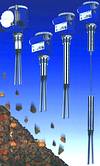

Endress+Hauser has confirmed its commitment to limit detection in bulk solids as an important market segment by developing a host of products aimed specifically at this sector. From capacitance to vibronics and paddle switches, for cost-effective solutions to the critical, aggressive and abrasive media with high temperatures and pressures, the company now offers a complete range of bulk solids level-switching solutions.
As the inventors of the tuning fork level-switch principle, Endress+Hauser has more than 20 years' application know-how over any other tuning fork manufacturer worldwide. Its latest tuning fork, the Soliphant II, is a universal vibration level limit switch for use in powdery and fine-grained bulk solids for grain sizes up to 10 mm.
The Soliphant II comes with many advantages. It is designed for a wide range of applications including those in explosion hazard areas or involving combustible dust. To ensure that the instrument fits most requirements, it is available in a compact, extendable rod or rope version with plastic, aluminium or Ex(d) housings. Accommodating universal input voltages and outputs, including 2 wire, 3 wire, relay and PFM signals for E Exia areas, the product is also capable of handling temperatures ranging from -40°C to 150°C, with a maximum operating pressure of 16 bar.
Other advantages include long product life, no maintenance and cost-effective installation, because no calibration is required. The company's capacitance level limit product basket caters for a broad spectrum of level detection in the solids market. The Minicap FTC 260/2 with active build-up compensation, patented by Endress+Hauser, is the complete package for maximum and minimum detection with the best price/performance ratio in the world. Other features include dust Ex approval and easy shortening of the rope versions for flexibility in installation. The maximum operating temperature and pressure is 120°C and 250 kPa (25 bar) respectively. The maximum permissible grain size is 30 mm. Supply voltage is flexible from 20-55 V d.c. to 20-253 V a.c. and output can be either relay or PNP. The instrument is certified for zone 10. Other advantages include no calibration, which saves on commissioning and reduces downtime.
The Multicap device is a robust capacitance probe, which features an electronic insert that can be adjusted to switch at a specific change in dielectric. The options available are a 2 wire AC version, 3 wire DC PNP and a universal input voltage with a relay output. The probe is also available with dust-Ex certification. The probe comes in rod or rope versions to suit all applications.
In media with high temperatures up to 450°C and pressure up to 50 MPa (500 bar), a ceramic probe is the best solution. These probes are remote from the associated electronics and are offered with a variety of transmitters. The certification ranges from nonhazardous to use in EEx ia areas.
These systems can be calibrated to switch on specific products with different dielectrics. Lastly, in addition to modern electronic sensors with no moving parts, for level detection in solids, mechanical variants such as the evergreen paddle switches still have their place in industrial applications. In addition to the simple principle and robust construction, the long term proven success validates its use.
Also offered is a cost-effective solution in the Soliswitch FTE30 paddle switch detector. This instrument measures grain sizes up to 50 mm with a minimum weight of 100 g/l. Wetted parts are stainless steel or Valox 553 (PBT) and the maximum operating temperature is 80°C and pressure 180 kPa (1,8 bar). Rod length is 75 to 600 mm and the rope version up to 2 m, which can be shortened. The input voltage is obtainable in 230 V a.c. 115 V a.c. and 24 V d.c. With its foundation in level limit detection, Endress + Hauser says it is able to offer a best-fit solution to all bulk solid switching applications.
Endress+Hauser
(011) 262 8000

© Technews Publishing (Pty) Ltd | All Rights Reserved